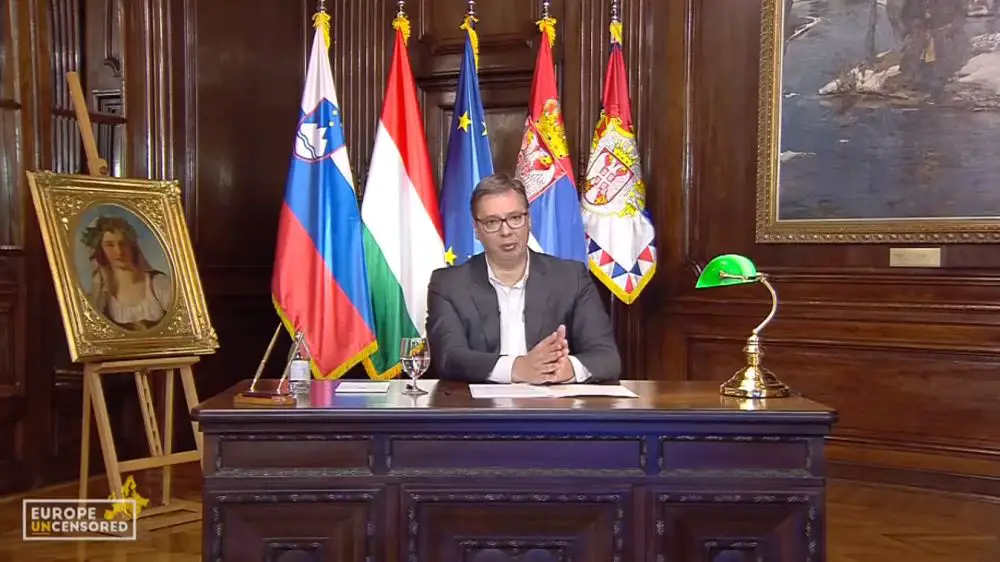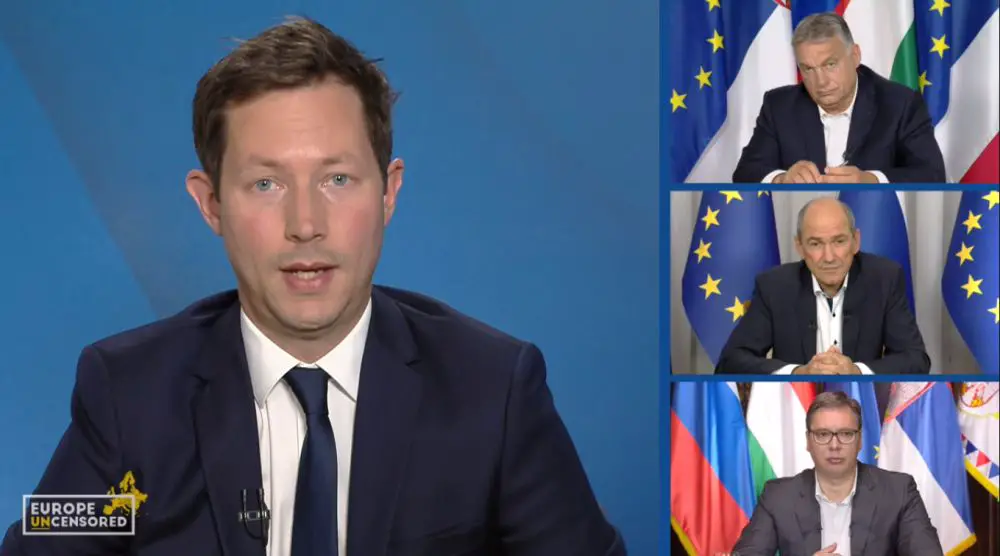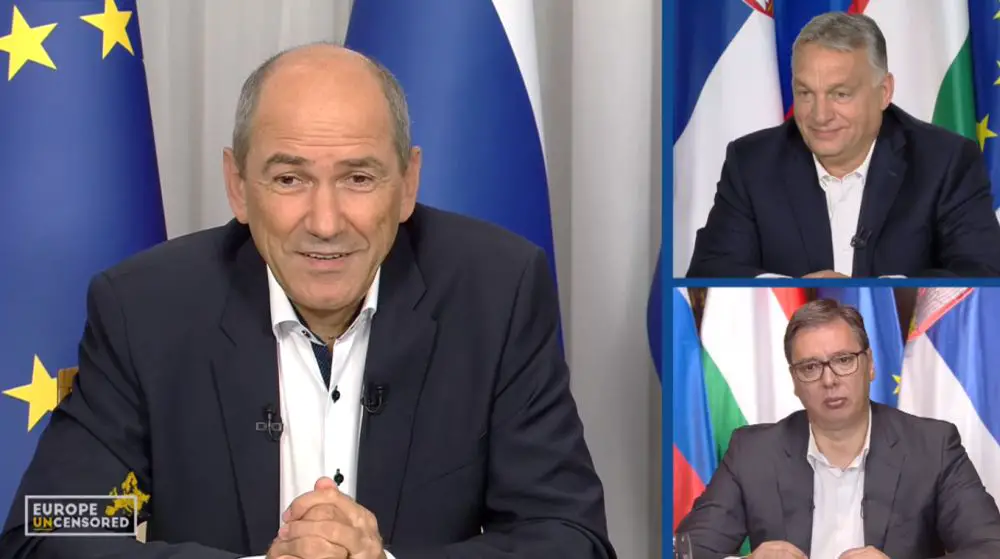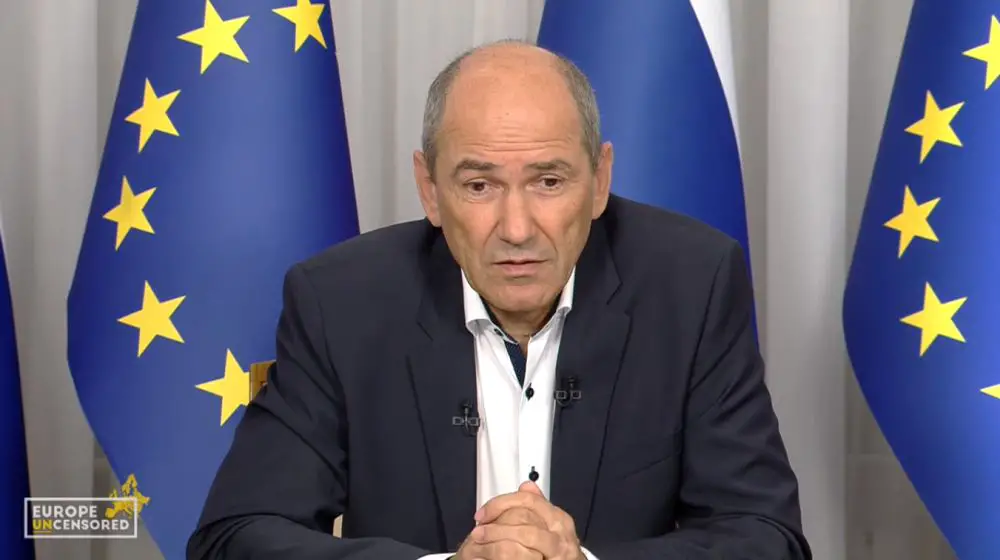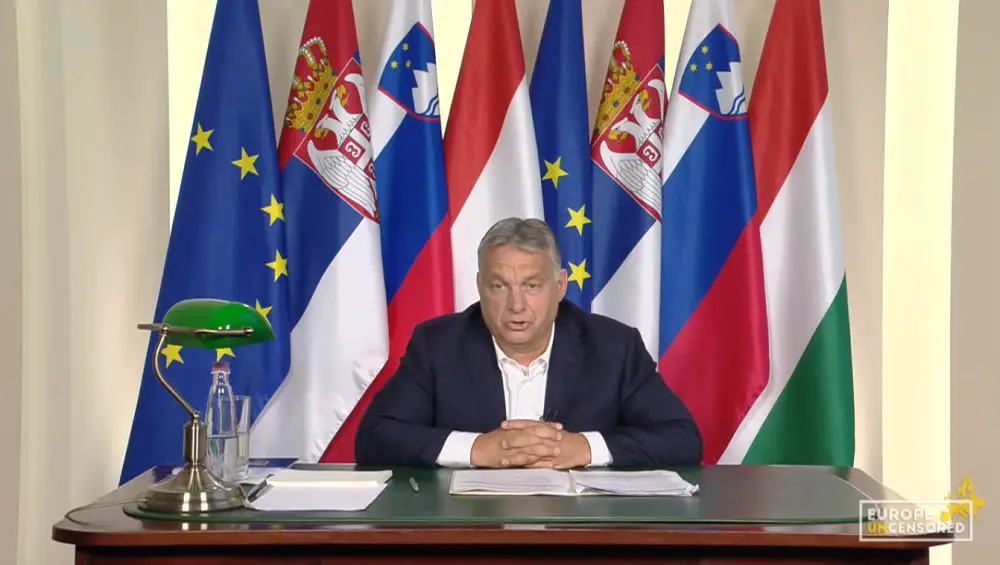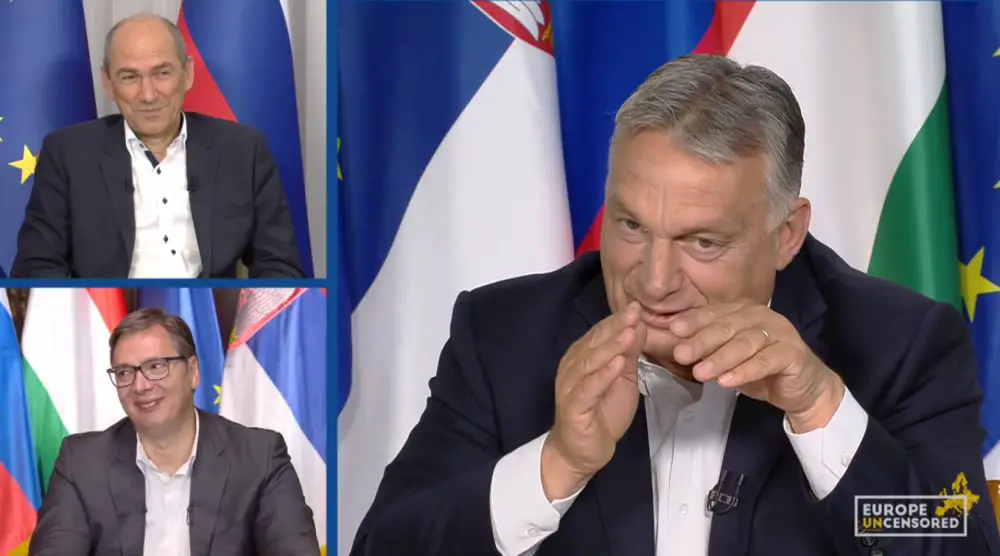In an online event called Europe Uncensored: European Leaders on the Future of Europe, organised by the Foundation for a Civic Hungary, Slovenian PM Janez Janša joined with Hungarian PM Viktor Orban and Serbian President Aleksandar Vučić in addressing what they believe are Europe's greatest challenges of the day.
In short, according to Janša and Orban these seem to be mainly the “progressive liberal leftists”, as Orban has called the ideological problem one needs to fight on the inside, or “Cultural Marxism” as Janša has called the same thing, while on the outside the EU is facing immigration and other external threats. Vučić joined in by calling for the mutual respect of differences among the European countries and offered the Serbian army to join the prospective European armed forces.
Aleksandar Vučić during his speech
Main frame: François-Xavier Bellamy
The event’s moderator, the French philosopher, MEP and Deputy Mayor of Versailles. François-Xavier Bellamy, opened with a conceptual progression from the End of History towards the Clash of Civilizations, before the “special club of freedom fighters”, as Orban referred to the group, followed with a speech by Vučić, then Janša and finally Orban, the organiser of the event.
Orban however did not really organise the event himself, as he corrected his fellow participants after they thanked him for his efforts, and explained that the event was organised by the Foundation for a Civic Hungary , and he only contributed the names of the speakers he considered worth listening to.
The online meeting was also advertised on the official government website of the Republic of Slovenia, where the Slovenian translation of Janez Janša's speech with a commentary was also subsequently published. The speech of the Slovenian PM should therefore be understood as the official position of the Slovenian government.
Janša: Golden Age of Dreams of a Whole and Free Europe
Janša began with a statement of Brexit being a “strategic catastrophe” that threw Europe out of its balance of power. The future of Europe therefore, according to him, depends on the solution to the question of the balance of power.
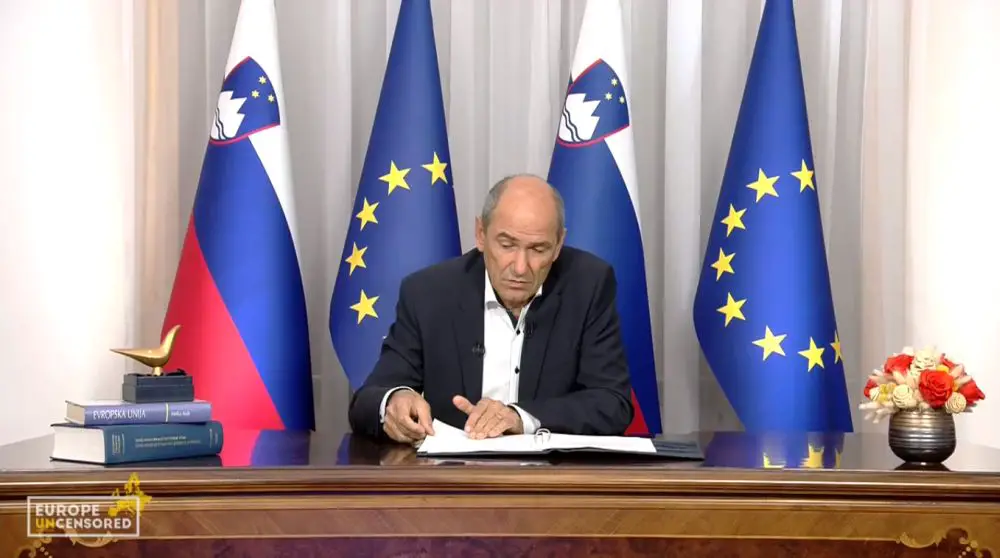
He then described what he calls “the golden era”, the enlargement period when everybody was optimistically speaking of Europe being whole and free, the era of “leaving the old world behind during the democratic changes”.
Then, however, the reality struck and among the “challenges” we are facing today Janša lists problems with the adoption of the EU constitution, the financial crisis, 2015 migrant crisis and the latest Covid19 epidemic. These issues pointed to some “unfinished projects” within the EU and the inability of various institutions to tackle them.
Mishandling of the migration crisis in 2015 contributed a certain percentage of votes in support of Brexit, concludes Janša, offering a possible cause for the “strategic catastrophe” he opened his speech with.
Janša : Institutional Changes Should Not be Europe’s Greatest Priority
Institutions, international in this case, also failed us in the current pandemic. For example, continued the Slovenian Prime Minister in his speech, global institutions such as the WHO, which have been created to prevent such things, were caught completely unprepared and for several weeks the European Union looked as if “in the Middle Ages”, with fences, walls and curfews, confiscations of medical equipment, without any real cooperation in place. The crisis is not over yet and the only way to avoid another lockdown is to focus on measures that work. We can only maintain our relatively normal lives by an introduction of app to monitor the spread of the virus, one app for the whole continent first, then perhaps one for the entire world if there is still no vaccine available.
This is no time on having big dreams about European institutions, Janša claimed, as this would create new instabilities. We need to stabilize the EU, we need realistic pragmatic steps forward.
Janša then proceeded with a proposal that gave Vučić’ membership in the “freedom fighters’ club” some substance. The Schengen border should extend to match the borders of the EU and the EU should expand and incorporate the Balkan countries who would like to join it. “This is the strategic answer made by Brexit and the fulfilment of the promise to make Europe whole and free.”
Janša: The Main Threat to Europe is “Cultural Marxism”
Main Frame: Janez Janša
Following his dismissal of the institutional changes being the main field in which we could tackle the problems of today, Janša then moved to the core point of his speech.
“Ideologically, the main threat to Europe is Cultural Marxism. I have been following what has been going on and I can clearly see the same formula, which was written in Communist Manifesto, written 200 and some years ago. To create a new world you need to dismantle family, private property, private schools, religion. And this is going on now. And it is obvious, there is massive offensive going on through mass media, universities, cultural industry, multinational institutions, some political parties. Everyone who stands against it is called a fascist, populist and heavily attacked from all sides. And we need a more united front against this, because this is the key issue, this is a battle for our way of life, this is the battle for Western civilization and in this battle much more is at stake than institutions only or EU only.”
According to Janša, the main problem within this “battle for Western civilization” is the demographic issue, as “if there are no Europeans, if there is no population which is sharing our values then everything is lost”.
With regard to immigration policy, Janša stated that he is against the migration policy as a “final solution” to the demographic problems of Europe. Immigration can only be treated as a demographic complement, since “cultural, economic and security considerations of migration need to be taken into account” or else the consequences can cause problems for all the partners inside of the European Union.
Janša: European Values are values of the European Christian Democrats
Janez Janša during his speech
If some ideas can be too old, others are never old enough in Janša’s search for an appropriate origin. Borrowing the term from the 18th century, when the world was ruled exclusively by men, and inserting it into the 20th century Europe, Janša stated that “the founding fathers, which were all Christian democrats” created the European Union in order to prevent the sad history from repeating itself. The European Union was created as a union of values, he said, and continues that it was the success of the early years of the European project which provided the “free world” with the power needed to dismantle the Iron Curtain and Berlin Wall, thereby allowing for the unification of Europe.
This process has not yet been completed, warns Janša, and finds the answer to European problems in returning to the original European values, and then to “fight for our people, for our nations, for our freedom for our way of life and for our future” which is a “noble challenge” of today’s “European central right, the Christian Democrats”.
Although all three speakers emphasized the importance of respect for political and ideological differences, little space for understanding respect as a two directional position was left after Orban’s speech in which he praised Janša as “the bravest anti-Communist in Europe”.
Viktor Orban during his speech
Orban’s main concern was in Europe’s “retreat”, a statement he supported with data showing a decline in Europe’s global relative economic output, population and military spending. Furthermore, Orban repeated the “balance of power” issue, which has been dramatically changed by Brexit with Germany sitting on the European throne again after it was “bombed into the Middle ages 75 years ago.” And thirdly, European politicians have a tendency to tell others in the world how to run their countries while they cannot even solve their own problems at home.
As for the solutions at hand, Orban cited two contesting socio-political models, “conceptions of Europe” which are the “progressive liberal leftist” in which “they promote multiculturalism, they are pushing over pro-migration policy, they follow an anti-family policy, they want to get rid of the concept of nation and nation state and they consider irrelevant the Christian social teaching”. The other conception of Europe is the opposite image of the first and is, albeit not without traitors, according to Orban, the ideological foundation of the European People’s Party (EPP). That is “a concept of the future of Europe, which is based on Christian culture that we have inherited, which cherishes the Christian social teaching, deeply anti-communist, pro-family, and it treats national identity as a value, which needs to be preserved.”
So with these two contesting “conceptualisations” within Europe, what can we do, asked Orban, having such differences, how can we stay together?
In an answer to this question, Orban then made a great leap forward and suddenly ascribed the previously discussed internal ideological division to an external attack on sovereign states: “the West should not impose its views on the Eastern countries. We need to learn to tolerate our differences again. We the Central Europeans should not go and tell the Westerners how they should go and run their countries. So if we are ready to accept that kind of differences even in terms of the vision of the future we can manage to live together and keep together the Union as a whole.”
Main frame: Viktor Orban
In case someone is still missing the function of the reiterated issue of the change in balance of power within the EU, Orban concluded his speech emphasizing the importance of the European grand strategy over the minor matter of human rights. To the problem of who then is to be the one to design the European grand strategy? “On the birthday of the EPP i wish it was the EPP to be the one.”
The full event is available here.


